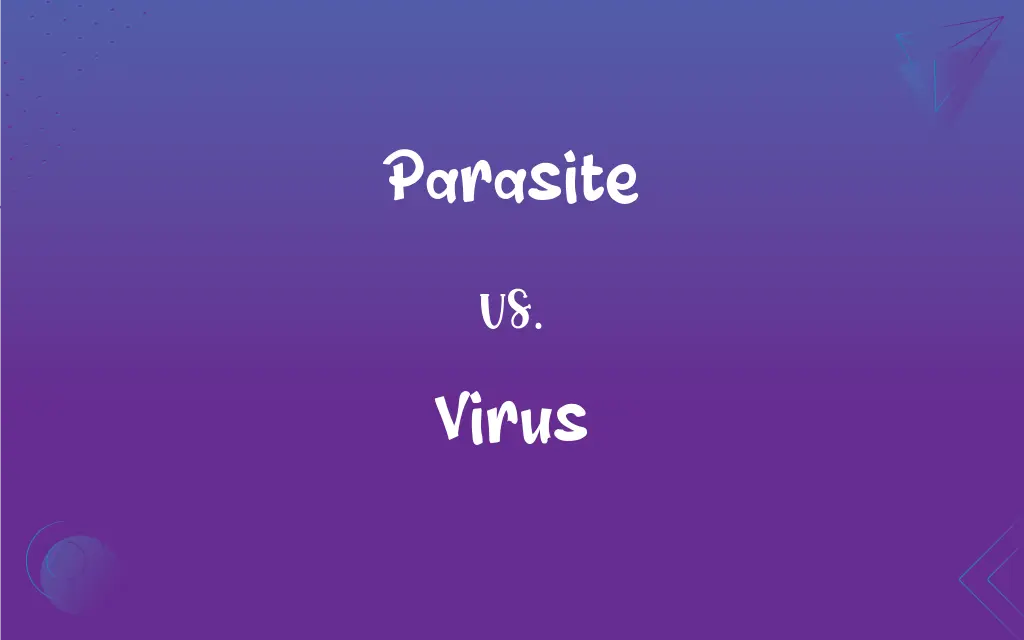Parasite vs. Virus: What's the Difference?
Edited by Janet White || By Harlon Moss || Updated on October 27, 2023
Parasites are organism living on/in another for nutrients. Viruses are microscopic infectious agent that replicates inside living cells.

Key Differences
Parasites are complex organisms that can live on or inside another organism (host) to obtain nutrients, often causing harm. Viruses, on the other hand, are simple, non-living entities that invade living cells, hijacking their machinery to replicate.
Parasites vary in size, from microscopic protozoans to larger worms. They often have complex life cycles. In contrast, viruses are much smaller and lack a cellular structure, consisting of genetic material encased in a protein coat.
Parasites can often live independently of their host for part of their life cycle, but they depend on the host for sustenance or reproduction. Viruses cannot replicate or carry out metabolic processes without a host cell.
While parasites can cause chronic infections and diseases, they usually don't kill their hosts immediately, as a long-term relationship is often beneficial. Viruses can rapidly kill cells, leading to more immediate diseases.
Treatment of parasitic infections often involves anti-parasitic drugs that target specific aspects of the parasite’s biology. Conversely, viruses are harder to treat, often requiring antiviral medications or vaccines that target specific viral components or boost the immune response.
ADVERTISEMENT
Comparison Chart
Part of Speech
Noun
Noun
Word Origin
Greek (parasitos)
Latin (virus)
Plural Form
Parasites
Viruses
Adjective Form
Parasitic
Viral
Derived Terms
Parasitology, Parasitize
Virology, Virulent
ADVERTISEMENT
Parasite and Virus Definitions
Parasite
A detrimental influence.
Corruption is often seen as a parasite on societal progress.
Virus
A harmful computer program.
Her computer crashed due to a virus infection.
Parasite
An organism exploiting another for resources.
The tapeworm is a parasite living in the host's intestines.
Virus
A microscopic infectious agent requiring a host.
The flu is caused by a virus that spreads easily.
Parasite
Something that resembles biological parasitism.
The spyware acts like a digital parasite on your computer.
Virus
Something that corrupts or poisons.
Fear can act like a virus, spreading through a crowd.
Parasite
A plant or organism living on another plant.
Mistletoe is a well-known parasite that draws nutrients from trees.
Virus
A viral element in culture or media.
The dance became a virus, quickly going viral on social media.
Parasite
A person who habitually relies on others for support.
He's been called a social parasite for living off his friends' generosity.
Virus
A tiny particle causing contagious diseases.
The measles virus is highly contagious and can lead to serious complications.
Parasite
(Biology) An organism that lives and feeds on or in an organism of a different species and causes harm to its host.
FAQs
What is a parasite?
An organism that lives on or inside a host, obtaining nutrients from it.
What is a virus?
A microscopic infectious entity that replicates inside living cells.
Can parasites infect plants?
Yes, parasites like mistletoe can infect and extract nutrients from plants.
Do viruses only infect humans?
No, viruses can infect various organisms, including plants, animals, and bacteria.
Can parasites and viruses coexist in the same host?
Yes, co-infections with both can occur in a host.
Are viruses alive?
Viruses are not considered fully alive as they can't reproduce or metabolize without a host.
How do parasites reproduce?
Parasites have varied reproduction methods, some sexually and others asexually.
How do viruses replicate?
Viruses replicate by invading host cells and using their machinery to produce new viruses.
Can parasites be beneficial?
Rarely, but some have symbiotic relationships with their hosts.
What's parasitism?
A relationship where a parasite exploits a host for its benefit.
What’s viral replication?
The process by which a virus makes copies of itself inside a host cell.
Do all parasites cause disease?
Not all; some can live in a host without causing noticeable harm.
Are all viruses harmful?
Most are harmful, but not all cause diseases.
What are common diseases caused by parasites?
Malaria, tapeworm infections, and toxoplasmosis are examples.
What are common viral diseases?
Influenza, HIV/AIDS, and COVID-19 are examples.
How are viral infections treated?
Treatment may include antiviral drugs, supportive care, or vaccines.
Can viruses be beneficial?
In rare cases, they can be used in gene therapy or to control pests.
Can parasites be visible to the naked eye?
Yes, some parasites, like tapeworms, are visible, while others are microscopic.
How are parasitic infections treated?
They are often treated with anti-parasitic medications.
Are there vaccines for parasites?
Few exist; developing vaccines for parasites is challenging due to their complexity.
About Author
Written by
Harlon MossHarlon is a seasoned quality moderator and accomplished content writer for Difference Wiki. An alumnus of the prestigious University of California, he earned his degree in Computer Science. Leveraging his academic background, Harlon brings a meticulous and informed perspective to his work, ensuring content accuracy and excellence.
Edited by
Janet WhiteJanet White has been an esteemed writer and blogger for Difference Wiki. Holding a Master's degree in Science and Medical Journalism from the prestigious Boston University, she has consistently demonstrated her expertise and passion for her field. When she's not immersed in her work, Janet relishes her time exercising, delving into a good book, and cherishing moments with friends and family.































































